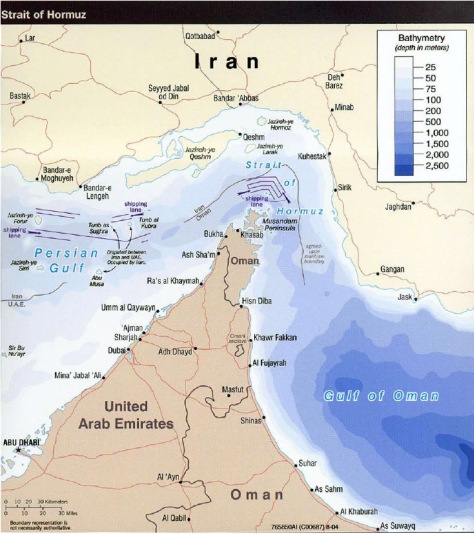Reuters reported last week that Iran and Oman have agreed to alter the route of an underwater gas pipeline planned to ship Iranian gas to Oman in order to avoid territorial waters of the UAE, Iranian oil minister Bijan Namdar Zanganeh , adding that the re-route would not have economic impact on the gas export project.

Français: L’Oman et l’Iran ont pris la décision la semaine dernière de changer le la route d’un pipeline à gaz sous-marin, lors de la planification d’opérations d’exportation gazière en bloc, pour éviter des eaux contrôlées par les Émirats Arabes unis, le ministre de pétrole de l’Iran a déclaré mardi après la réunion avec son homologue omanais à Téhéran.
Le pipeline planifié connecterait les énormes réserves de gaz de l’Iran avec des consommateurs omanais aussi bien qu’avec les usines de gaz naturel liquéfié (LNG) en Oman qui pourrait ainsi réexporter ces réserves de gaz par la suite
Press TV added to this that Iran expects to finalize talks over an ambitious project to export natural gas to Oman through a subsea pipeline in early March. This new meeting is a part of a general framework of an agreement signed in 2013 to export natural gas to Oman through a pipeline from under the Arabian Gulf seabed.
Based on an agreement signed in 2013, Iran will export 28 million cubic meters of gas to Oman per day for a period of 15 years through a pipeline that will go to the sultanate through the Persian Gulf.
Almost a third of the gas exported by Iran to Oman will be turned into liquefied natural gas (LNG) in the sultanate’s Qalhat plant, and the rest will be consumed domestically.
Iran will accordingly use the LNG produced at Qalhat plant for exports to European and Asian markets. (Press TV)
Companies which are included in this project as France’s Total, Royal/Dutch Shell, South Korea’s Korea Gas Corporation (KOGAS), Germany’s Uniper and Japan’s Mitsui attended the bilateral meeting between Oman and Iran.
Nonetheless, the Iran-Oman gas pipeline will be more expensive than initially thought after the two countries agreed to alter the original route plan to avoid passing through UAE waters, reuters reported in the past, quoting an industry source in the know.
Oman is closer to Iran than the rest of the Persian Gulf states since it is separated from them by a rather craggy range of mountains, it also has a significant Baluch population which speak an Iranian language and has also been part of Iran in classical times
Today the Gulf countries, and especially Saudi Arabia, maintain very adverse relations with Iran. Other countries (i.e. Kuwait, Qatar, UAE and Bahrain) in the Gulf Cooperation Council (GCC) generally follow the Saudi lead when it comes to their relations with Iran and the regional policies. However, Oman is the only country that maintains somewhat friendly relations with Iran, reflecting a exception.
Oman’s cordial relations go back to the 1970s when the Shah regime supported the new Sultan Qaboos against the leftist rebels in Dhofar. Iran also sees Oman as an opening to the international markets. Oman did not support Iran’s regional adversaries as in the Iran-Iraq war and the conflicts in Syria and Yemen. Instead, it chose to mediate between Iran and its rivals in many occasions, the latest of which was the Nuclear agreement in 2015. While being part of the GCC, Oman refuses to transform it into the Gulf Union, it maintains a relatively strong economic and military relations with Iran. In the aftermath of the nuclear deal the relations will be even stronger between Iran and Oman.
Trade between Oman and Iran exceeded $1 billion by the end of October last year, according to Dr Ali bin Masoud Al Sunaidy, Sultanate’s Minister of Commerce and Industry.(Times of Oman)
Iran’s oil minister holding talks with Omani counterpart on the planned Iran-Oman gas export pipeline https://t.co/Fpe9G0gBo6 via @ncitayim pic.twitter.com/3vqxGTxCsZ
— MESP (@mestrate) 7 février 2017
#Iran, #Oman to Finalize #Gas Pipeline Negotiations – https://t.co/VD15NRoJej pic.twitter.com/8X3m600p5X
— MinistryofPetroleum (@VezaratNaft) 8 février 2017
Credit Map: Shana.
Links:
- Will Fulton and Ariel Farrar-Wellman, “Oman-Iran Foreign Relations,” American Enterprise Institute Iran, Tracker, 21 July 2011, http://www.irantracker.org/foreign-relations/oman-iran-foreign-relations.
- Oman and Iran: friends with many benefits, Al-Monitor, http://www.al-monitor.com/pulse/originals/2016/04/oman-iran-friends-ties-gcc-disapproval-saudi.html
-
Iran, Oman reaffirm gas export project, change pipeline route to avoid UAE, Reuters, http://www.reuters.com/article/iran-oman-gas-idUSL5N1FS2ZK.
-
OMAN’S 2016 GEOPOLITICAL CHESSBOARD : A DISCREET ACTOR IN THE MIDDLE EAST
-
IRAN, OMAN SIGN DEAL TO STUDY SUB-SEA GAS PIPELINE:TIMES OF OMAN




